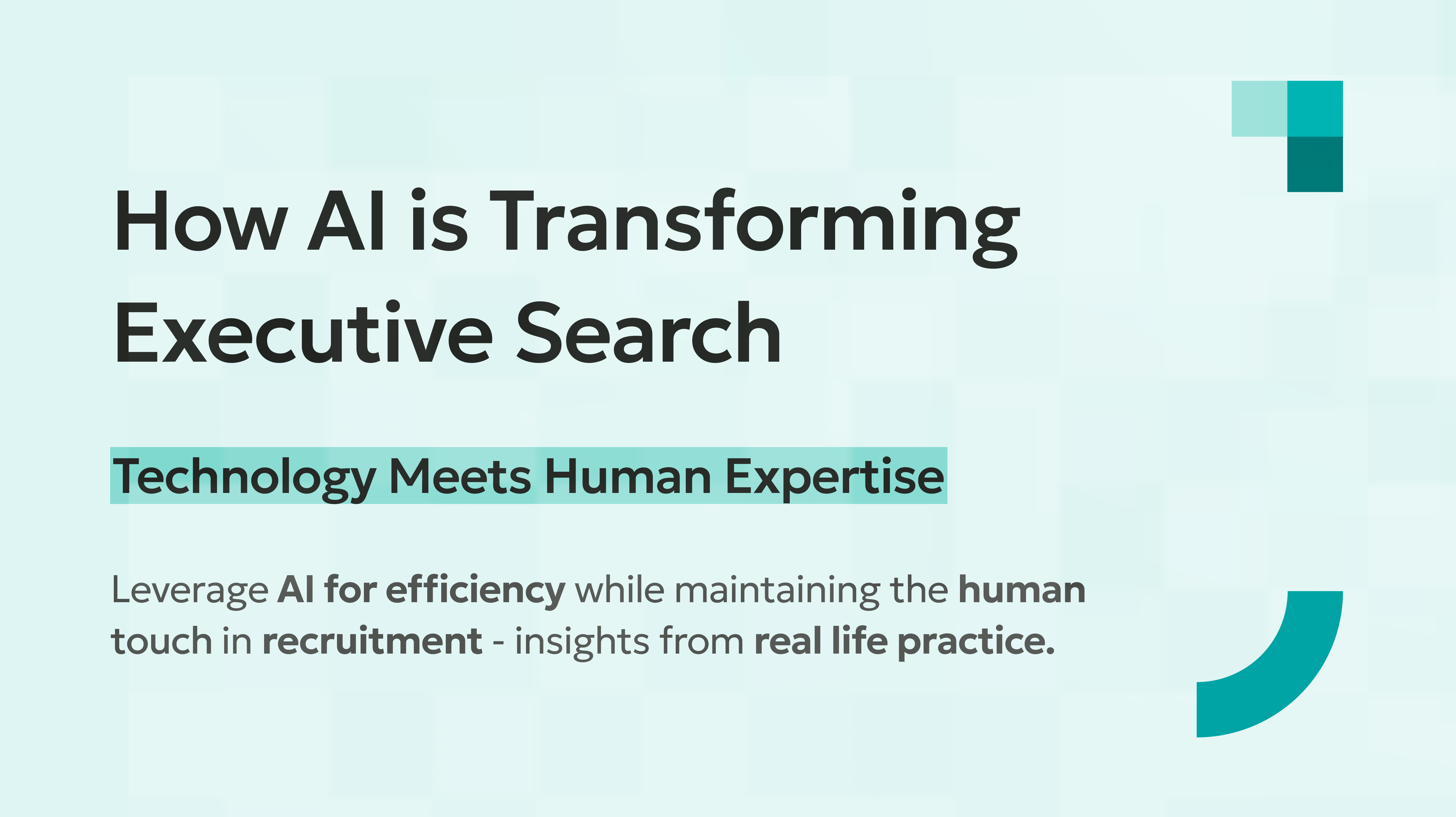Key Takeaways
- AI enhances recruitment efficiency, precision, and diversity but requires human judgment for nuanced roles.
- Ethical practices and data privacy are essential for leveraging AI effectively in recruitment.
- GetFrankly combines AI innovation with human expertise for superior executive search outcomes.
Are you already using AI in your recruitment efforts? Although it might seem like AI took every industry by storm and sometimes is uncomfortable, it also helps make HR processes more efficient and reshape how we approach recruitment.
In today’s article, we are diving into how AI transforms HR and executive search and how to use it to achieve the best possible results.
Key benefits of AI in executive search
Save hours on recruitment tasks with AI
When we think about AI, the first thing that comes to mind is efficiency because AI does best by simplifying day-to-day HR tasks.
Let’s look into a couple of examples together.
One of the most repetitive and time-consuming activities in recruitment is screening resumes. AI-powered tools can look through hundreds or thousands of applications in minutes, identifying candidates whose skills and experiences align with the role.
Another task that requires effort is drafting the job descriptions. AI can automate this process and create tailored JDs to specific roles. Plus, it can also help post them across multiple platforms and manage personalized communication, such as sending customized emails to candidates, updating them on their application status, or scheduling interviews.
Regarding interviews, HR people know that the logistics behind scheduling them are time-consuming. AI tools can automatically schedule interviews by syncing candidate availability with recruiter calendars, minimizing back-and-forth communications. Beyond scheduling, AI chatbots can handle preliminary candidate interactions, answer FAQs, and gather essential details to streamline the interview process.
“At GetFrankly, we use software and AI/automation tools to save time for what truly matters and adds the most value: spending time with candidates and clients in direct interactions. We have automated many administrative tasks at every stage of the recruitment process, from content creation to posting across multiple platforms and personalized mass communication, among others.”
Darius Popirtac, Managing Partner
Expanding access to high-caliber and diverse talent
But how about passive candidates? AI tools are helping with this as well.
For example, AI-powered platforms like LinkedIn Recruiter, Rival HR, and SeekOut can analyze vast data from professional profiles. They identify key indicators such as recent certifications, involvement in high-profile projects, or subtle profile updates that suggest a candidate might be open to new opportunities.
Another thing AI does is to uncover hidden talent. For instance, platforms like HireEz use AI to aggregate data from multiple sources to identify candidates with specialized skills, including GitHub, Kaggle, or even niche forums. Such candidates may not appear in traditional keyword searches but could be ideal for a specific executive position.
Moreover, AI is solving one of the most significant blind spots in recruitment: unconscious bias during the sourcing process. Multiple AI tools can help recruiters focus on skills, achievements, and qualifications to ensure equity in hiring.
‘’Using AI in sourcing strategies and market mapping enables us to execute specific actions or directions that might be overlooked during early stages. This approach is especially beneficial when mapping the market and creating keyword mixes, offering a unique opportunity to reach profiles that might not be immediately apparent.’’
Darius Popirtac, Managing Partner GetFrankly
Leveraging predictive analytics for long-term success
At GetFrankly, we value culture fit, especially at the executive roles level. The good news is that AI can help us save time. It can analyze data from a candidate’s professional history, social media activity, and interview responses to determine whether their values align with the organization’s mission and goals.
Let’s see how this works!
For example, if one of your business’s core values is innovation, AI can flag candidates with a history of contributing to groundbreaking projects or thriving in dynamic work environments.
AI also helps track success metrics after hiring. For instance, it can monitor new hire performance data, such as their progression within the company or the impact of their projects, to refine future hiring strategies. It can also evaluate retention rates by identifying patterns in the tenure of successful hires versus those who leave prematurely.
“The way we do things at GetFrankly is that we use advanced tools to analyze a candidate’s resume before the interview, helping to identify any potential gaps or discrepancies between their profile and the requirements of the role. This allows recruiters to prepare more effectively and ask targeted questions that address these areas during the interview process.
At the same time, the recruiter remains central to the selection process. By leveraging these tools, they can significantly enhance their efficiency, reduce preparation time, and focus more on evaluating the candidate’s overall fit for the role and company culture.” Darius Popirtac, Managing Partner GetFrankly
Balancing technology with human judgment
The limits of AI in executive search
As we already mentioned, although AI is great at technical screening and saving us time for administrative work, there are still limits to what the technology can do, especially in executive search.
We noticed that it usually falls short in assessing soft skills, emotional intelligence, and leadership potential—qualities critical for executive roles. These nuanced traits require human intuition and expertise to evaluate effectively. Plus, you must consider ethical considerations such as data protection law, transparency, informed consent, etc.
“We view AI as an add-on for recruiters that can assist in specific contexts by speeding up processes such as content generation, text and profile analysis, and preparing interview questions or scenarios. However, the recruiter remains the one who orchestrates the recruitment process, leveraging these tools to increase efficiency and focus on what truly matters.”
Darius Popirtac, Managing Partner GetFrankly
Future trends in AI and executive recruitment
Since we previously talked about limits, let’s look at the future and how AI might develop further.
AI predicting candidate readiness for career transitions
AI tools are improving at identifying when professionals might be ready for a career change. For instance, platforms like LinkedIn can analyze activity patterns, such as increased profile updates or participation in industry events, to signal potential interest in new opportunities.
AI-powered communication and engagement
AI-powered chatbots, like Paradox, enhance candidate engagement by providing instant, personalized communication. For example, candidates can use chatbots to schedule interviews, ask questions about the role, or receive timely updates, creating a seamless and engaging experience.
Virtual Reality (VR) and Augmented Reality (AR) in recruitment
Emerging technologies such as VR and AR allow candidates to explore workplaces remotely. Companies can use VR to offer virtual office tours or simulate job-related tasks, helping candidates better understand the role and environment before joining.
GetFrankly’s approach: enhancing AI-driven executive search
At GetFrankly, AI is an add-on to our executive recruitment work. Our AI solutions handle repetitive tasks—like candidate screening, market mapping, and content generation—so we can focus on what matters most: directly engaging with clients and candidates.
For example, we use AI to analyze candidate profiles and identify any discrepancies early, ensuring we’re always targeting the best fit. Moreover, we use tools like Checkr for background and reputation checks.
We’ve also automated many administrative tasks, from posting job openings across multiple platforms to preparing interview scenarios. This ensures our recruiters can dedicate their energy to strategic decision-making and cultural alignment.
Ultimately, while AI enhances precision and efficiency, our recruiters remain at the center of the process, ensuring every step reflects our client’s unique needs and the leadership qualities they seek.
Conclusion
AI is transforming executive recruitment by streamlining processes, enhancing precision, and expanding access to talent. However, the balance between technology and human expertise truly drives success. For a strategic, personalized approach to executive search, trust GetFrankly to deliver unmatched results.
AI Tools in Executive Search FAQs
What role does AI play in executive recruitment?
AI streamlines processes like resume screening, market mapping, and communication. It automates repetitive tasks, enabling recruiters to focus on cultural fit and strategic alignment.
Can AI help reduce unconscious bias in hiring?
AI can analyze candidate profiles based solely on skills and achievements, minimizing unconscious bias and promoting a more diverse and inclusive talent pool.
How does AI identify passive candidates?
AI tools scan platforms like LinkedIn to identify passive candidates by tracking profile updates, certifications, and professional activities, highlighting those ready for new opportunities.
Why is human expertise still essential in recruitment?
AI supports efficiency, but recruiters bring intuition and judgment to assess soft skills, emotional intelligence, and leadership qualities in executive roles.







